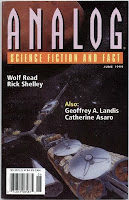
Another fine issue with some very good stories.
A Lovely Little Christmas Fire • shortstory by Jeff Carlson
Gene-modified super-termites with highly unlikely biochemistry eat all plant matter in seconds, have escaped to a city, and are destroying house and office buildings. Teams are fighting against them, but the termites seem to spread just too fast - like someone would be spreading them on purpose. Fairly standard story - nothing really bad but nothing especially good either. ***+
As Women Fight • shortstory by Sara Genge
The gender is determinated by fights occurring by set intervals. The winner can choose which body he/she wants to inhabit. Practically always the winner chooses the female body. The gender roles are very sharply defined – the female who takes care of the children seems to have most authority in the family, while the male provides the food. Pretty well told story, but there are a few problems. One would imagine that the ability to transfer personalities between bodies would lead to less clearly defined gender roles. Also, it doesn't seem plausible that those in female bodies seem usually have the upper hand in the fights. ***½
Animus Rights • shortstory by John Shirley
Two aliens inhabit human bodies as and fight as a sort of a game through centuries. Pretty old fashionable story with nothing really surprising. Could well be from the Galaxy magazines from 50s I have been reading. **1\2
Leaving the Station • shortstory by Jim Aikin
A young woman, who was able to see ghosts as a child, inherits an antique store from her uncle. As she doesn't happen to have a job at a moment, she moves in and starts to manage the store. Soon she starts to see ghosts again...Very good story, well written. The ending is a bit sad in a way. ****
Angie's Errand • shortstory by Nick Wolven
After war which has devastated everything a young girl tries to cope with pressures of raising her younger siblings. She feels unprotected as they live in a house which is separated from the main village without any adult males living with her. Well written but not much happens. The girl makes at least one just too stupid choice - but that is a choice some 16 year old girl makes somewhere every day. ***+
A Large Bucket, and Accidental Godlike Mastery of Spacetime • novelette by Benjamin Crowell
The ambassador of human race is is traveling between stars with ambassadors of several different species's. They are traveling at relativistic speeds, so time is passing very fast in outside universe. The human finds herself as a kind of leader for some of the races traveling on the ship. Will it be possible that the humanity will graduate to “Galactic Civilization”? Another very good story, well written, fascinating, would like to read more of the main character. ****-
The Bride of Frankenstein • shortstory by Mike Resnick
A diary of Dr. Frankenstein's wife. The main story is fairly same as Shelley's version, but the events happen in undefined time, somewhere between 1920-1930. And the ending is far more positive that in the original version. Well written, very good story. Not as sacharine as Resnick's stories tend to be. Woudn't be surprised if this will be found in ballots. ****+
Some Like It Hot • novelette by Brian Stableford
A man and woman have known each others since being small children. Their (single) parents both worked for EU, and later they also ”inherit” jobs working for EU. They meet usually once a year for their common birthday. The story tells mainly about their different approaches to the solving and adapting to the climate change. As such the content of the story is pretty good, but problem is that the story is ALL exposition. Discussions between the characters is mainly exposition, and that is juxtaposed by pure exposition between their meetings. Everything is told, practically nothing is shown. The story felt like an overlong draft for an interesting novel. ***½






























